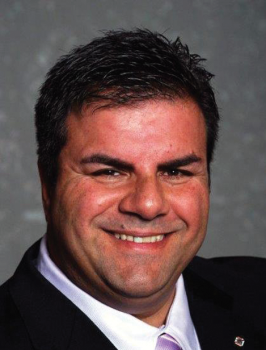
The Toronto Catholic District School Board (TCDSB) voted unanimously Thursday evening to save the popular International Language program.
Parents, community members and teachers erupted in thunderous applause as the board rejected a report from staff recommending the program only be taught outside of regular school hours. The program offers thousands of elementary students 30 minutes of daily instruction in a language other than English or French.
“I was so overwhelmed with emotion; it was such a joyous moment,” said Oksana Cherchyk, whose daughter learns Ukrainian at Josyf Cardinal Slipyj Catholic School.
Trustee Sal Piccininni introduced a motion asking the director to keep the program as a pilot for the next year, while the board works with the province “to keep international language programming ... for future years.” The board approved it, and classes will now be offered four days a week, instead of five. Twenty four people, students, parents, members of community organizations and even the Italian consul general - spoke at the meeting to make the case for keeping the program.
“The community showed the board it was very united,” said Luciano Schipano, an Italian instructor at St. Wilfrid Catholic School in North York. “It’s a huge achievement.”
Schipano was also happy that almost 80 language instructors in the district will keep their jobs.
A labour dispute between the union representing classroom teachers and language instructors not certified by the Ontario College of Teachers and the school board, put the program at risk. International language teaching is not considered part of the core provincial education curriculum, so it does not count toward the legally-mandated 300 minutes of regular instructional time.
Therefore, schools that teach international languages have historically stayed open for an extra 30 minutes each day as part of an “extended day” program.
This created a bifurcated system where some schools would end at 3 p.m. and others ended at 3:30 p.m. In June 2017, the Toronto Elementary Catholic Teachers Association lodged a complaint with the board, arguing it was unfair to require classroom teachers at schools that offer the program to stay for an extra 30 minutes each day. An arbitrator decided in favour of the teachers and so the school board believed it could no longer lawfully offer the program during regular school hours. So, staff proposed to offer it before school, after school or on Saturdays. This upset parents who preferred language classes integrated into student’s regular classes, and language instructors whose jobs would be at risk.
The new motion is a compromise. It keeps the language program in place during school hours, allows all classroom teachers to go home at the same time, and preserves the jobs of language instructors. Maria Rizzo, vice-chair of the TCDSB, said it was, “more than a win-win.”
The changes still require approval from the Ministry of Education. The motion calls for the ministry to amend the curriculum to allow international language classes to be taught during the 300 minute school day.
Piccininni and Rizzo said members of the government have expressed verbal support.
“I am grateful and satisfied that the province stepped up to finally do the right thing for international languages for student achievement for kids and I look forward to working with them to iron out details,” said Rizzo.
Dan Koenig, an official in the director’s office, said the director of education at the school board will meet with the education minister soon to discuss next steps.
Contribution courtesy of the CBC














